
Wetland Robin
April 1st, 2009
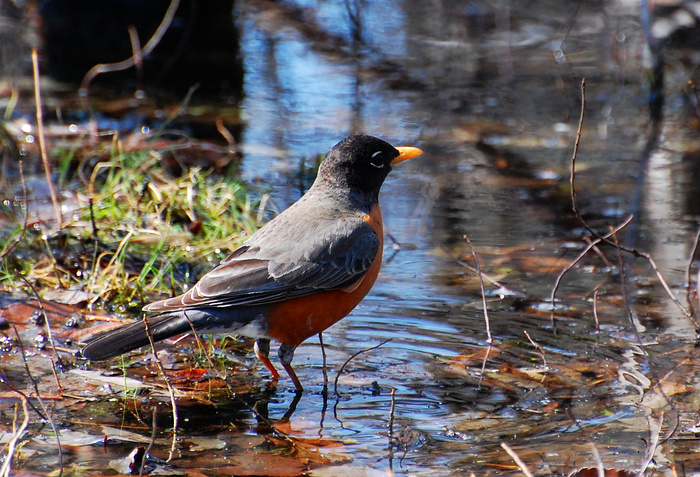
1680x1050 wallpaper
The Project
March 29th, 2009
I watched for some time as this Blue Jay poked, prodded, fussed and fiddled with what looked like an old leaf. Only when I studied the pictures back home did I realize it wasn't a leaf, though I'm still not sure what it was. Cocoon, maybe?

1680x1050 wallpaper
Blue Jays can be so gorgeous, it's hard to believe that they have no blue pigment in their plumage at all. But it's true: the color is caused by the structure of the feathers and the way light refracts through them. In other words, if you grind up a Blue Jay feather, it won't be blue anymore.
Wood Duck Strut
March 28th, 2009
Took a few friends out to Mud Lake today, and had a great time.
The wetland was still somewhat asleep, though with a growing patch of open water around the bridge and another near Cassels Road, and muskrats and beavers therein. Mallards, Black Ducks and Canada Geese were around. I told my companions about the beautiful Wood Ducks who breed on the pond, but that they hadn't migrated back yet.
Well, I spoke too soon. When I came back there later on my own, several pairs of Wood Ducks had arrived! They were skittish at first, but grew accustomed to my presence as I waited, and finally, one of the male/female pairs hopped up onto the hand railing to survey the area.
And then that male? Strutted it. Upright, crest poofed out, mating calls, the whole bit, as m'lady looked on adoringly. I'd complain that they weren't in a more natural setting when I shot this, but I think that would count as looking a gift bird in the mouth.
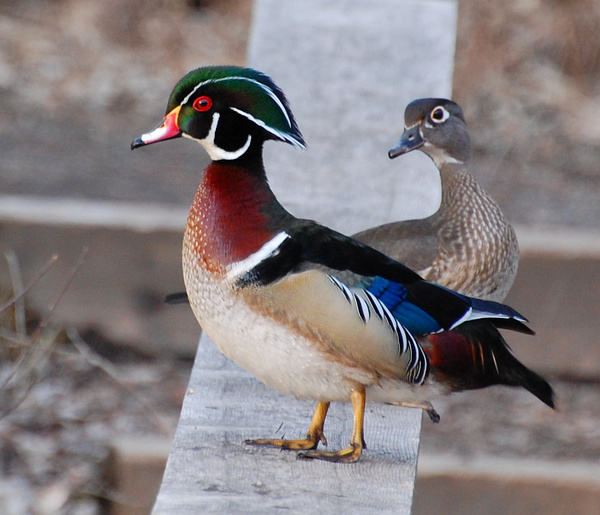
Here's another shot. The slicked-back appearance of the male's crest here is typical. (I had never before seen it poofed out the way it was in the previous picture.)
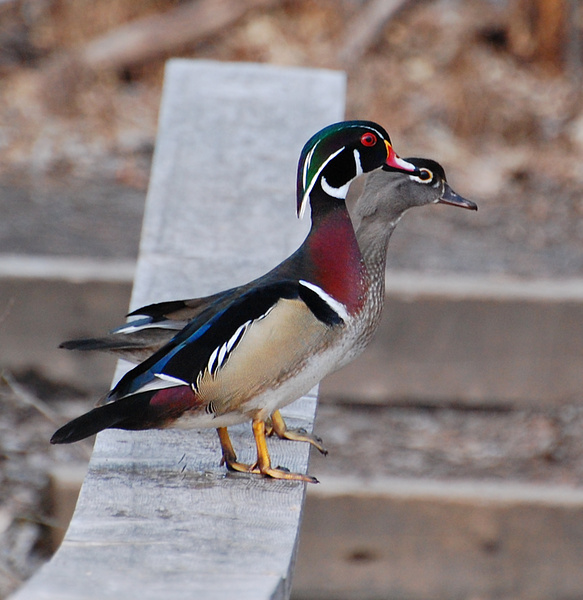
When a male Wood Duck is on the water, his whitish belly doesn't show. Only the "painted" parts show. He's as perfect as a faberge egg.
Pileated Woodpecker
March 24th, 2009
I decided to post this since at least one person thinks that the mushroom does not ruin the picture. And I guess Pileated Woodpeckers are magnificent enough that I'm willing to cut them some slack when it comes to composition!
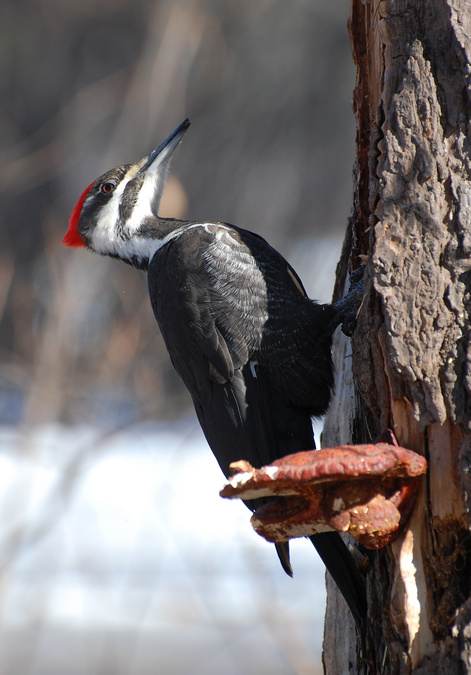
She's female. You can tell because the sideburns are black instead of red, and the red crest doesn't extend onto her forehead.
Speaking of woodpeckers, I'm amazed this tree is still standing:
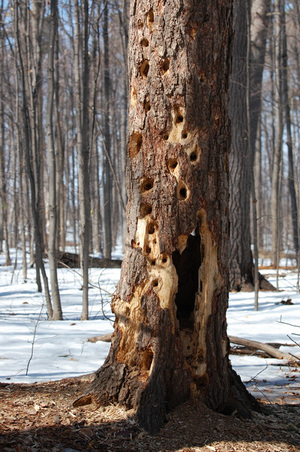
When a young drake's fancy...
March 22nd, 2009
On the Rideau today, two male Common Mergansers vied for the affections of a female, racing and chasing each other back and forth while she watched:
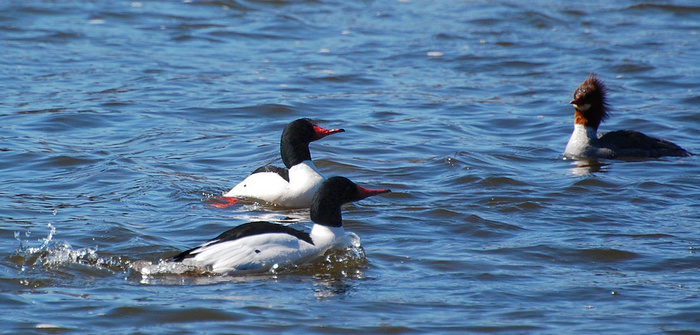
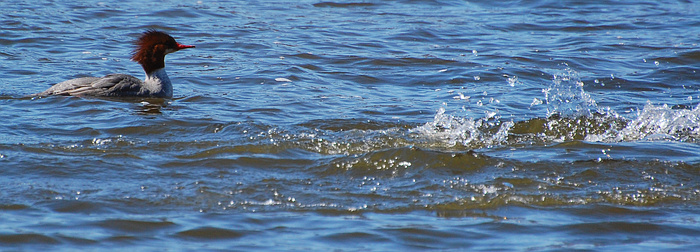
The phrase "boys, boys, boys" came to mind.
Some days...
March 21st, 2009
Took the camera out to Mud Lake Friday. Unfortunately it was one of those days when my best intentions turned to naught. Saw newly arrived Common Grackles and Song Sparrows, but no decent pictures of either one. Got a picture of a House Finch looking singularly ill-tempered, a chickadee picture that didn't quite work, and a gorgeous Pileated Woodpecker with a great honkin' mushroom blocking the view.
But all was not lost. Because I got this chipmunk in glorious hi-res:
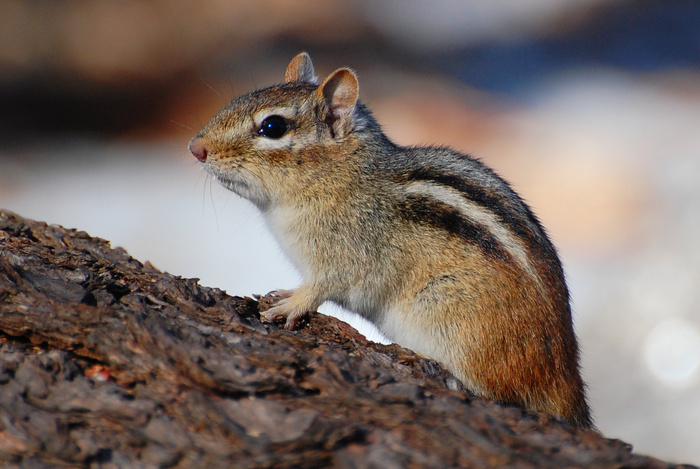
1680x1050 wallpaper
Common Goldeneyes impress the ladies
March 20th, 2009
The goldeneyes on the Rideau are courting in earnest.
Goldeneye courtship generally means a small group of restless drakes swimming with one or two females. The males crane their necks, arch their necks, and occasionally, very suddenly (like a tic), pop their necks all the way back. That last maneuver is often followed by a "squeak-squeak" sound and a splash of water.
Meanwhile, the females mill around looking quite unimpressed by the whole affair. But they eventually choose their mates. The choice is made on the wintering grounds, with each pair migrating back to their breeding grounds together.
Last year, during which hundreds of them wintered on the Rideau, this was a downright extravaganza. I remember walking along the shore at dusk, the water speckled with rafts of ducks, and the air filled with delicate "squeak-squeak" sounds. I could barely see them, but I knew very well what they were up to. I called it the goldeneye nightclub.
It's less of an extravaganza this time but still fun to watch.
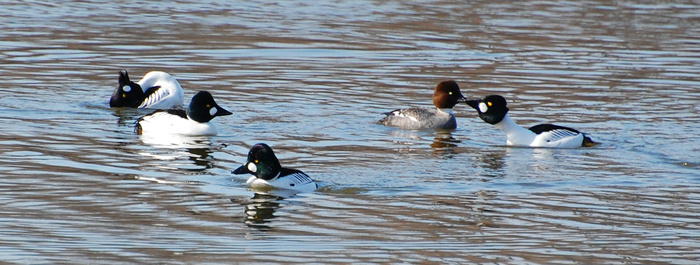

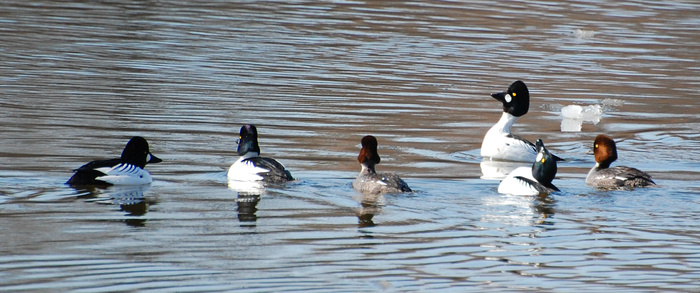

Welcome back, Red-Winged Blackbirds
March 18th, 2009
As expected and fondly anticipated, male Red-Winged Blackbirds have once again taken Mud Lake (and doubtless other marshes and wetlands) by storm. They'll be working on establishing their territories over the next few weeks. After that, the females arrive!
Of course, the redwing is one of those birds that anyone in Ottawa who wasn't born blind has seen many times. Nevertheless, such a beautiful creature deserves to have its arrival heralded. So:
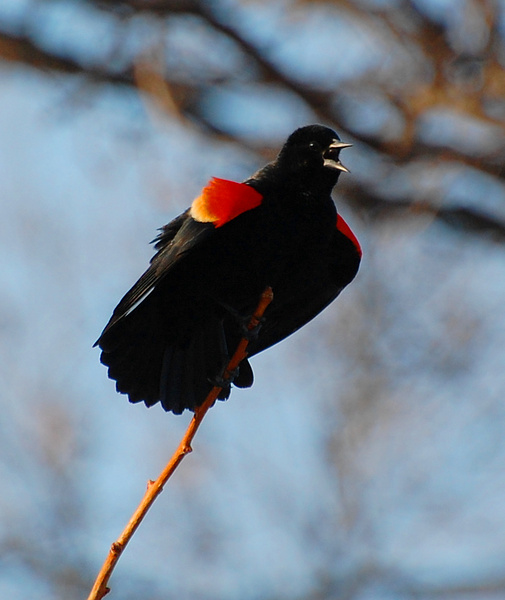
Early Spring Waxwings
March 15th, 2009
I went down to Mud Lake yesterday afternoon and was delighted to find nature waking up all over the place. Crows carrying nest material, robins and cardinals singing, chipmunks out of their burrows, Red-Winged Blackbirds freshly arrived from migration, and last but not least, waxwings galore.

1680x1050 wallpaper
In a brushy area near the outside fence of Mud Lake, a mixed flock of Cedar Waxwings and Bohemian Waxwings, along with a few robins, had staked out some small trees with last year's buckthorn berries. They clustered in taller trees and sallied down by ones or twos to pick the berries. The above was one of the Bohemians.
Another view of him:

Bohemian Waxwings have been here all winter, but these were the first I chanced to see since spring of 2008. The arboretum is often a good place to find them (they like crabapples). They'll be on their way out now, heading back to their breeding grounds in the far north.
Here are a couple of the Cedars:
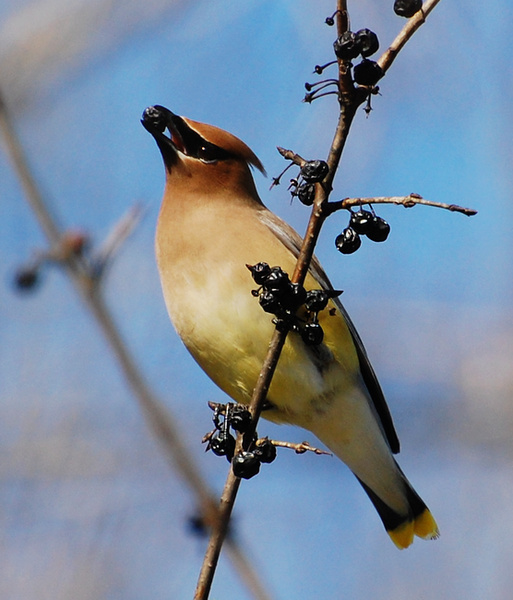
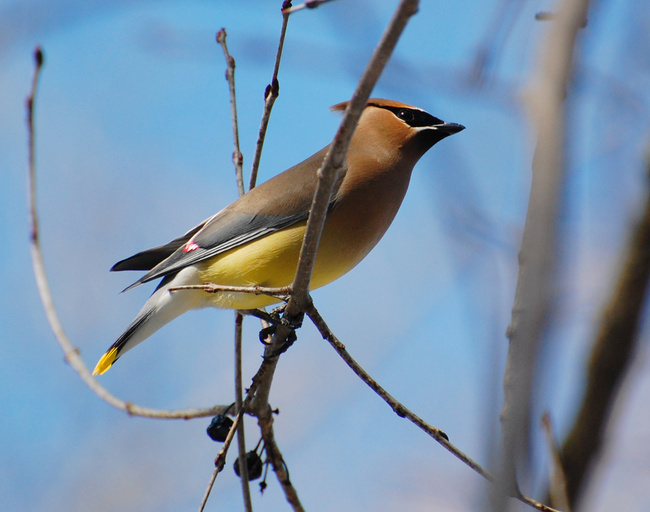
To me they're even more gorgeous. I love the warm gold of their bellies blending into brown. Fortunately for me, Cedar Waxwings are common breeders in our area!
Waxwings, collectively, are among the gentlest and gentlemanliest of birds. Their social structure is egalitarian. They never squabble. Naturalists have seen them line up on a branch and pass a berry from bird to bird. Each bird patiently passes it along, the last bird eats it, and then the ritual repeats until everyone is fed.
They are also jokingly known as the "party animals" of the avian world. In their eagerness to stuff themselves with berries in spring, they sometimes ingest fermented berries by mistake, and become quite drunk.
Spring migration begins
March 7th, 2009
Spring migration has begun!
The recent warm spell has successfully coaxed a few forerunners of the early-migrating species into Ottawa. In the Britannia Conservation Area today, numerous flyovers of 1-2 Canada Geese near the river, plus three of them standing at the edge of the rapids. In a scrubby field to the southeast was a twittering all-male group of Slate-Colored Juncos. Ring-Billed Gulls are back in force and have begun to colonize the Lincoln Fields parking lot.
Any day now Red-Winged Blackbirds will return. I can't wait.
|
